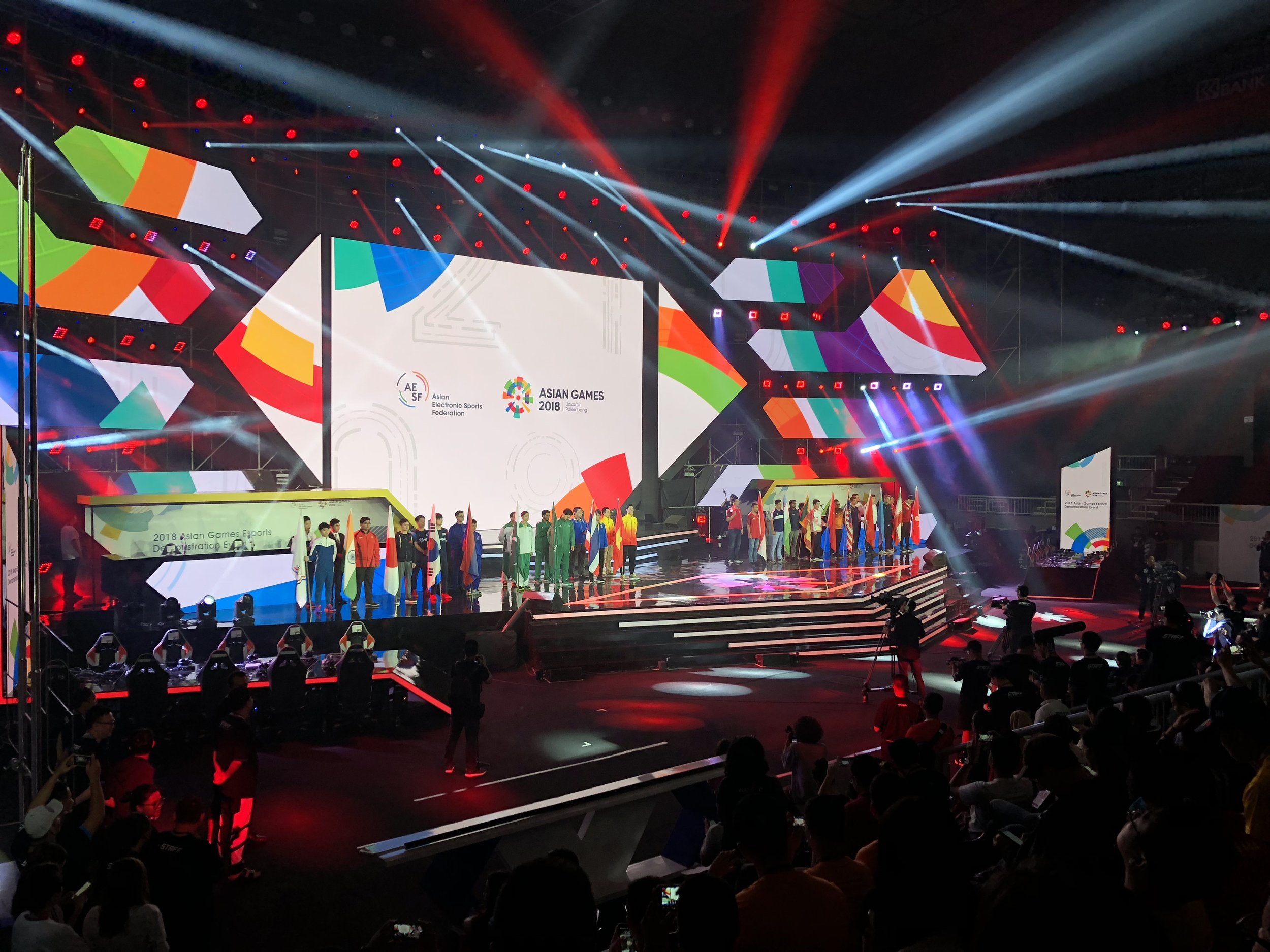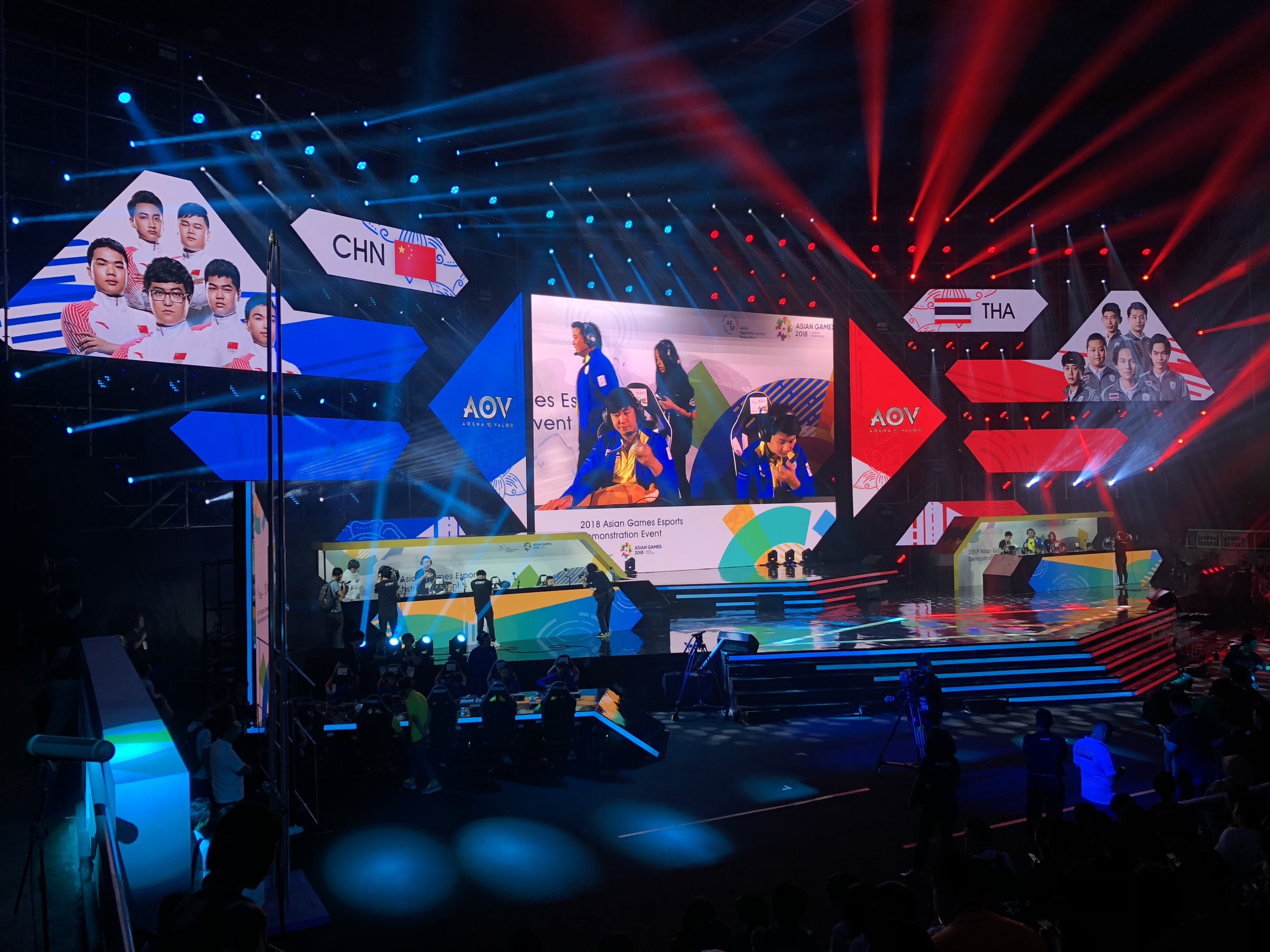JAKARTA, Indonesia — A world record is a big deal, right? In any sport, right? On Sunday, Iran’s Olympic champion, Sohrab Moradi, broke weightlifting’s longest-standing world record.
Competing in the snatch in the men’s 94-kilogram class, Moradi lifted 189 kilos, or 416.6 pounds — one kilo better than the old mark, 188, set in 1999 by Greece’s Akakios Kakiasvilis.
Big news in Iran, for sure. Maybe Greece, too.
So you want to know why weightlifting is on the ropes as an Olympic sport and esports is crazy hot?
Setting the stage at weightlifting for Moradi's world record
Setting the stage for esports -- now, which is visually and, just generally, more appealing?
Never even mind the doping that for years and years has riddled weightlifting. There’s that, of course. Moradi, the 94-kilo Rio 2016 gold medalist, served a two-year ban after a positive test for methadone — which he has said was caused by a mistake over a painkiller, not an intent to cheat.
Here at the 2018 Asian Games, Moradi’s performance in the snatch took place before maybe several hundred people. The production values at the hall: an electronic percussive beat but otherwise no music, no lights, no sound. Incredibly, it wasn’t until Monday — a full two days later — that the International Weightlifting Federation’s website featured a mention of the sport’s longest-lasting world record having been broken, by one of its stars, from a country where the sport really matters. Under “actual news.”
Compare:
On Sunday, at another hall — mind you, 45 minutes away from the center of town, so if you wanted to get there, you had to work at it — the opening ceremony of what was billed as the “2018 Asian Games esports Demonstration Event” got underway before a house packed with fanboys and fangirls who thrilled to a world-class light and sound show driven by first-rate production values and more.
That opening ceremony saw the competitors — the athletes, 135 competitors from 18 national Olympic committees — line up just like they do in every other Olympic-style event, with their national colors and symbols. The South Korean flagbearer, Lee Sang Hyeok, who goes by his video nom de plume, Faker, is a League of Legends rock star, with well over $1 million in career earnings.
Time now for the purists to get over the disdain.
Last month, at a conference at the Olympic Museum in Lausanne, Switzerland, the International Olympic Committee sent a strong signal of its interest in figuring out whether and how esports might be a fit for the Games. Paris in 2024 would be too soon; Los Angeles and 2028 would be just about right.
To be clear, many complicated questions remain to be addressed before esports might appear at the LA28 Games — or, for that matter, at any Olympics.
IOC president Thomas Bach has made plain that no games involving violence, for instance, can in any be considered. He called this a “red line” barring “killer games or where you have [the] promotion of violence or any kind of discrimination as a content.”
Adding to the complexity, surely: the deadly shooting Sunday at an event center called The Landing in Jacksonville, Florida, that was playing host to a Madden 19 qualifying tournament. Madden 19 is the current version of the NFL football video game put out by EA Sports.
Two were killed and 10 others wounded, officials said. The suspect, David Katz, 24, of Baltimore, took his own life, authorities said.
First and foremost, game maker Electronic Arts got it right in a tweet:
It’s too soon for a full accounting of what happened in Jacksonville. It’s also entirely uncertain if event held appropriate security. Late Sunday, the Los Angeles Times reported that some industry figures were tweeting that security for such tournaments was often lax. As the paper noted, here was a tweet from Seth Abner, a popular Call of Duty player:
Also, as Associated Press reported, this from the tournament director for the Evolution Championship Series, an esports event that focuses on fighting games:
Christian Tamas, director of esports programs for Twitch, a platform that broadcasts many game livestreams, chimed in:
To be sure, at the Jakarta esports event, there was Olympic-level security, including law enforcement and airport-style metal detectors.
In an interview Monday, the president of the Asian esports Federation, Kenneth Fok of Hong Kong, chief organizer of the demonstration tournament, said, “No one here in any right mind is going to promote violence.”
He also said it would be entirely unjust to link the actions of an individual with literally hundreds of millions of people worldwide: “Is the gaming community to be blamed? It’s unfair for it to be blamed for the actions of a single individual.”
Court records obtained by AP made plain that Katz had a history of mental illness.
His parents’ divorce filings also say Katz played video games obsessively as a young teen, often refusing to go to school, AP also reported, quoting his mother in court filings as saying, “When I took his gaming equipment controllers away so he couldn’t play at 3 or 4 in the morning, I’d get up and find that he was just walking around the house in circles.”
Fok added, “Unfortunately, in society these people exist. It’s not stereotypical of the whole gaming community … I hope there’s not this link that people make this assumption.”
An echo of this notion on Twitter:
It’s the case that Sunday’s action here in Jakarta featured an eight-team tournament — China won, with Chinese Taipei taking second, Vietnam third — of the fantasy battle game Arena of Valor. It would likely be a considerably uphill climb for a game such as AOV to make it into the Olympics.
Monday brought the first of three days of the League of Legends tourney, with 53 players from eight nations. It falls into the MOBA category, too — that is, a “multiplayer online battle arena” game.
Later this week: Pro Evolution Soccer and, for those who recall the game played as a demonstration around the PyeongChang Winter Games, StarCraft II. Earlier: Clash Royale, Hearthstone.
Anyone who understands the first thing about the Olympic scene knows the demonstration here at the Asian Games — under the purview of Sheikh Ahmed al-Fahad al-Sabah of Kuwait, head of the Olympic Council of Asia and a key IOC powerbroker — is no accident.
At the 2022 Asian Games in China, esports will be a full-on medal event.
“Today marks the beginning of something exciting, something historical,” Fok said Sunday from the stage in his welcoming remarks.
“This is a special moment in the development of esports, and I hope it is the same for the future of the Asian Games and the Olympic movement. As the IOC … recognizes, esports can be a platform to engage the youth. I hope today’s competition can be judged as such a platform to spread Olympism and its values.”
Later, he added, “We are all walking [in] uncharted territories. We are learning as we go along, as the Chinese proverb describes accurately, we are all wading the river by clutching on one stone at a time.”
To continue with the philosophical bent:
Much of the antipathy toward esports can almost surely be traced to a deeply held understanding of what is “sport” — and whether “sport,” for instance, involves a ball, or some variant of physical activity, or sweating, and on and on.
“Sports doesn’t mean you must sweat,” Faker told Reuters here.
“Gaming uses a lot of mental skill rather than physical. It takes a lot of mental strength and requires a lot of effort and tough training, so I think esports could be even tougher than any other sports.
“I think it is unfair to say that a sport depends on whether one sweats.”
To this end, Olympic Broadcasting Services chief Yiannis Exarchos gave a talk in February, around the 2018 Olympics in South Korea, that’s worth reviewing anew.
Most sports, he said, were developed in the 19th century, with roots in the “ample space and time” of the British countryside. For instance: soccer.
Times have changed.
“Ultimately,” he said, “the responsibility [for proposing new sports] is the job of the IOC session,” its general assembly, “but it goes without saying that the constant influence of broadcasters is toward sports closer to the younger generation — sports that are easier to set up in an urban environment."
So, for instance, in Tokyo, you’ll see 3x3 basketball along with sport climbing and skateboarding.
To wrap your mind around esports means thinking about “space and time” differently.
That’s what the fanboys and fangirls crowded into Britama Arena here — for AOV, League of Legends and the other esports action — do.
China and Thailand squaring off in AOV at Britama Arena
When you watch a weightlifting champion snatch 189 kilos, you don’t think to yourself, wow, I can do that. You think, that guy is amazing. Inspiring.
To a significant degree, fans in the stands at an esports event project themselves into the game play. It’s a far more personally immersive experience.
Put another way: you can feel you are, to an incredible degree, in the game — along with the players actually playing it.
The Olympic movement’s No. 1 challenge — always, eternally — is to remain relevant with its core audience.
That core audience is young people.
Young people have made it crystal clear what they want. They live on and through their screens. Follow this to the logical conclusion. When it comes to esports, it’s a no-brainer. When you feel you are literally part of the action, of course you want in, and that’s why the participation, engagement, finance and other numbers are trending skyward.
The challenge for the Olympic movement is to figure out how to make it all work, and this is key: it’s not an either-or.
You don’t have to have track and field or esports. Swimming or esports. Wrestling or esports.
This proposition is not “or.” It’s “and.”
“So where are we heading?” Fok asked rhetorically. “Four years ago, attending the Incheon Asian Games,” in South Korea, “I never dreamt that we would be here today hosting esports in Jakarta.
“Let us not try to predict where esports will be four years, eight years from now. But if we have an open mind and the will to collaborate, laying the groundwork one brick at a time, only then we can take esports to new heights.”




